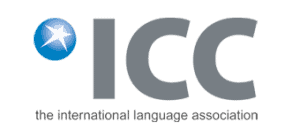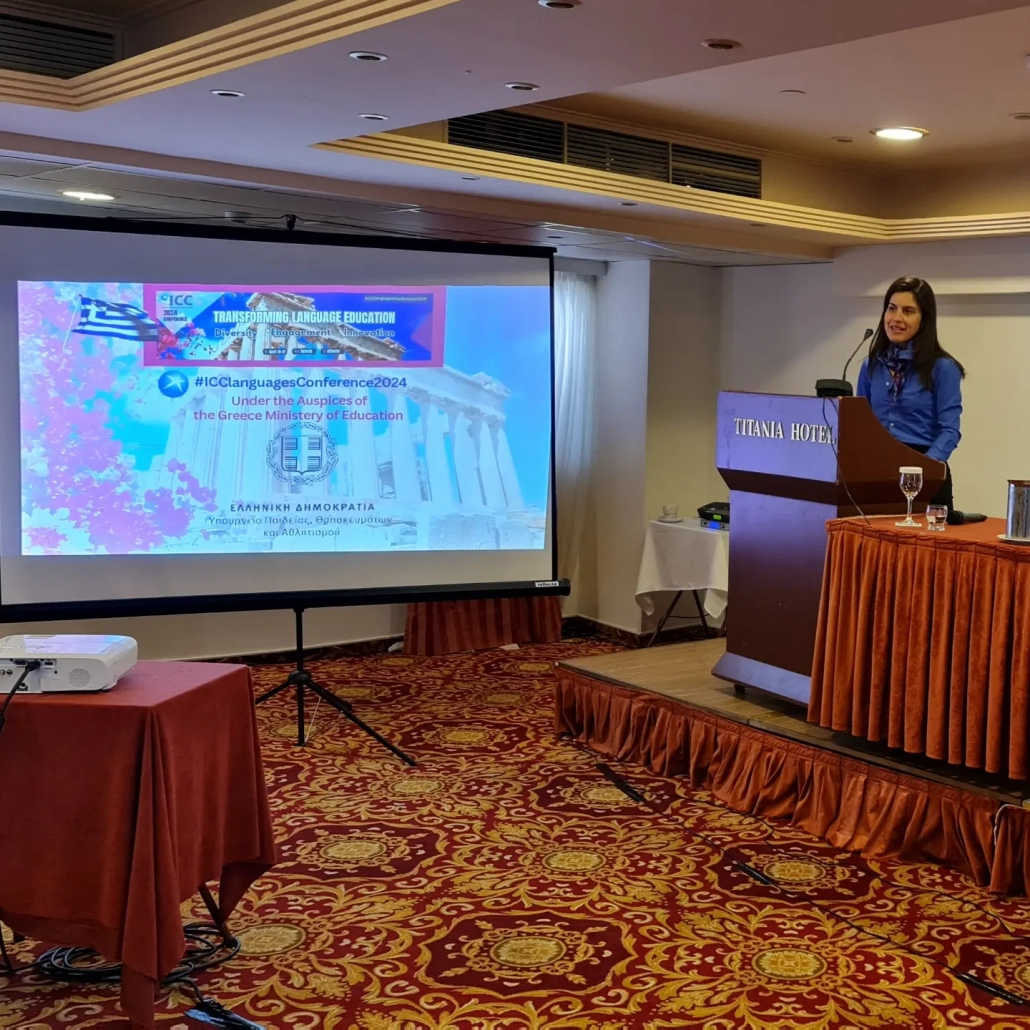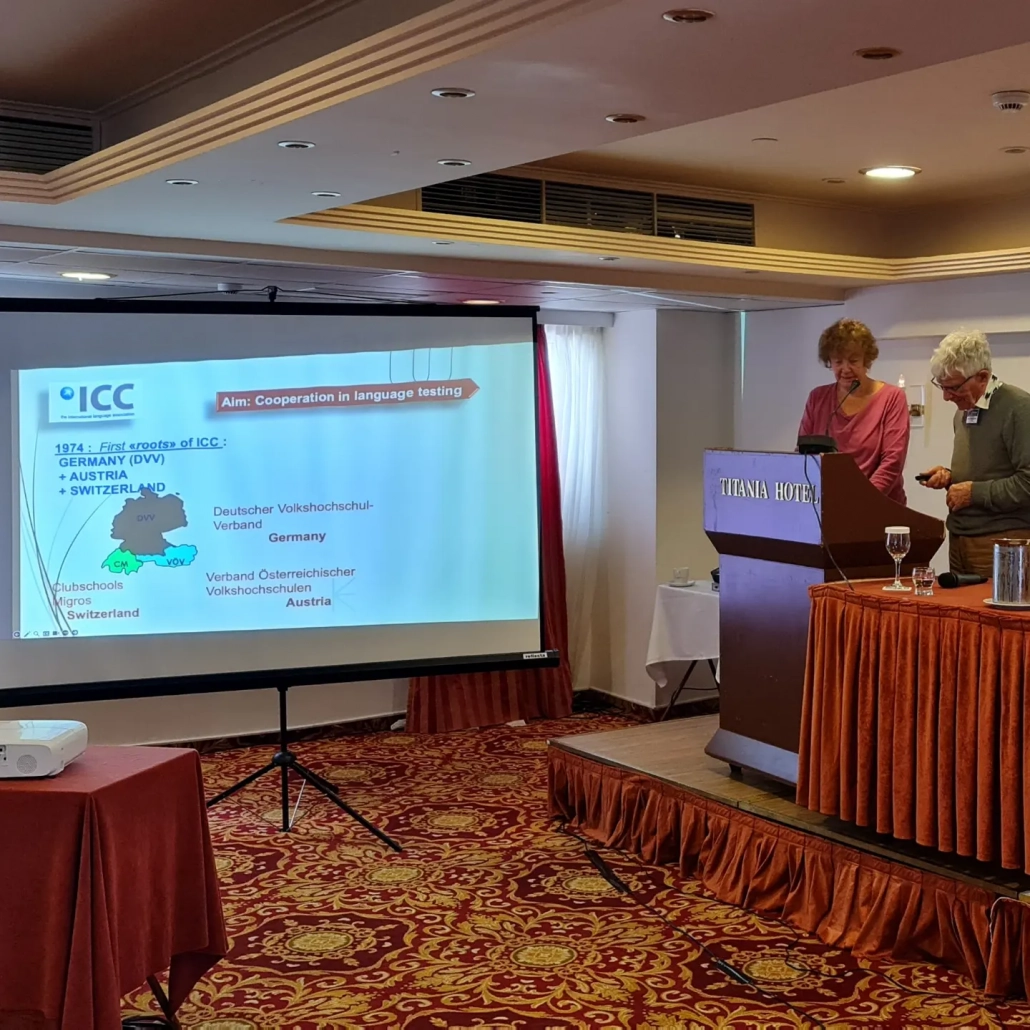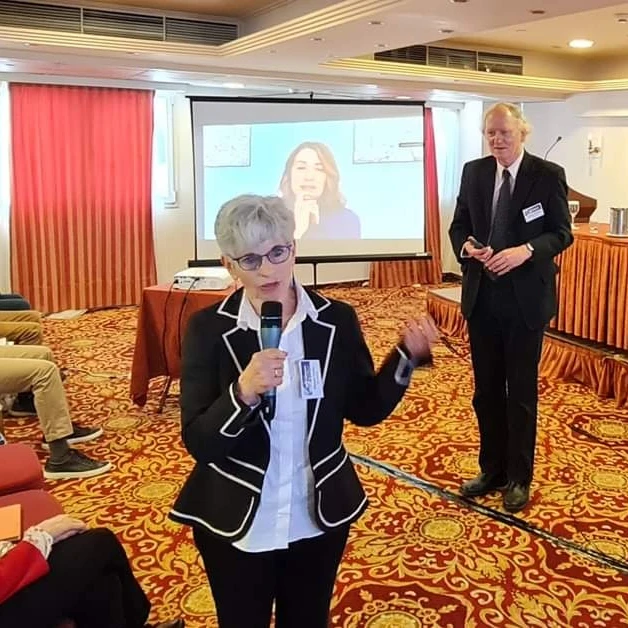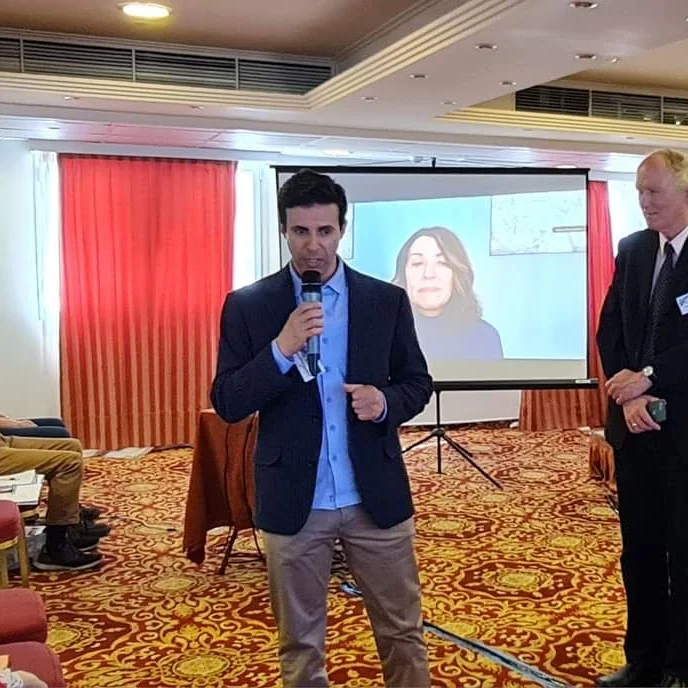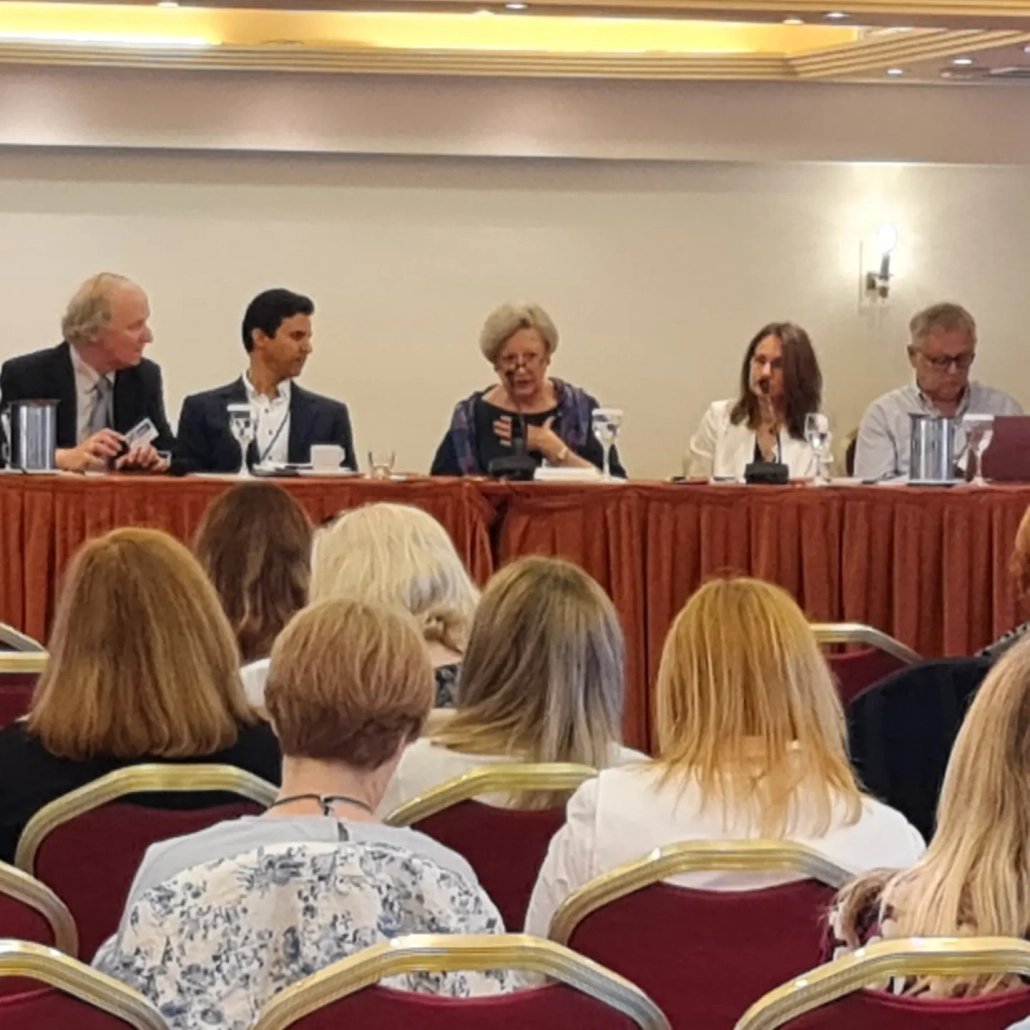2024 ICC Conference
Athens, Greece, 19 – 21 April 2024 (hybrid event)
The ICC Co-Chairs and Board are delighted to announce that the 2024 ICC-Languages Conference, with the theme Transforming Language Education – Diversity, Engagement and Innovation is set to take place at Titania Hotel Athens, Greece, from April 19 to 21.
The 2024 ICC-Languages Conference, held in Athens, Greece, from April 19th to 21st at the Titania Hotel, brought together 70 participants from various countries, both onsite and online, to explore the theme of Transforming Language Education – Diversity, Engagement, and Innovation.
This conference serves as a platform for the exchange of innovative ideas, the dissemination of research findings, and discussions addressing challenges and opportunities in language education.
Scholars and practitioners will convene to explore the conference theme, fostering discourse related to language teaching and learning.
This conference served as a platform for the exchange of innovative ideas, the dissemination of research findings, and discussions addressing challenges and opportunities in language education.
Scholars and practitioners convened to explore the conference theme, fostering discourse related to language teaching and learning.
Exploring Language Education Dynamics:
The conference comprehensively addressed a wide spectrum of themes critical to modern language education, encompassing navigating language learning amid global challenges, promoting the well-being of educators and learners, fostering learner autonomy, and integrating artificial intelligence into language education methodologies. While discussions around supporting migrants through language instruction for work and employment were present, the conference also explored various other facets of language education, reflecting the evolving linguistic landscapes and diverse needs of our societies.
Insightful Keynote & Plenary:
Renowned speakers such as Professor Linda Fisher from the University of Cambridge and Professor Bessie Dendrinos from the National and Kapodistrian University of Athens captivated attendees with their keynote addresses. Prof Fisher emphasised the development of learners’ multilingual identity, while Dendrinos explored mediation as a tool for interactive learning in multilingual educational environments.
Hybrid Format, Comprehensive Programme:
The conference embraced a hybrid format, accommodating both onsite and online participants. Sessions ranged from workshops on adapting new technologies to empower language teaching to panel discussions on the transformative potential of language education. Participants engaged in lively discussions, exchanging innovative ideas and best practices.
Empowering Educators, Enriching Practices:
Throughout the conference, educators were empowered to enhance their teaching practices, leveraging insights from cutting-edge research, practical workshops, and the integration of artificial intelligence (AI) into language education. Topics such as promoting cultural and linguistic skills for personal interacting with migrants and asylum seekers across Europe, desigining thinking, integrating virtual exchange for global competence in English language teaching, utilising critical incidents to improve international business communication, and harnessing AI-powered tools to personalise learning experiences sparked valuable conversations among participants.
Concluding Thoughts:
The 2024 ICC-Languages Conference provided a dynamic platform for collaborative discourse, fostering a community committed to advancing language education worldwide. As participants departed with enriched perspectives and actionable strategies, the ripple effects of their shared insights promised to shape the future of language education for years to come.
Transforming Language Education: Diversity, Engagement and Innovation
Key Topics:
- Navigating Language Learning and Teaching amid Global Challenges
- Promoting the Well-Being of Teachers and Students
- Nurturing Autonomy for Learners and Educators
- Exploring Intercultural and Plurilingual Dimensions
- Integrating Artificial Intelligence in Language Education
- Empowering Learners in the Digital Era
- Supporting Migrants: Language Instruction for Work and Employment
Keynote Speaker: Prof Linda Fisher
Professor of Languages Education, Faculty of Education, University of Cambridge

Transforming Language Education:
Why and how educators might focus on developing learners’ multilingual identity in the languages classroom
Abstract
A rise in migration and transnational mobility has led to increased and increasing diversity in the multilingual profile of many classrooms. This has implications not only for the identities of migrant students who are learning the language of their new country, but also for those engaging in language learning in schools. In this talk I explore why a new dimension of pedagogy might be necessary to help all learners to fully understand their own and others’ linguistic repertoires (whether learned in school, at home or in the community) and so to recognise their agency in being able to claim a multilingual identity. I draw on evidence from a series of studies conducted as part of a four-year project (MEITS: Multilingualism: Empowering Individuals, Transforming Societies) involving teachers and over 2,000 students from schools in England. After proposing that multilingual identity is shaped by ‘three Es’ (learners’ experiences with languages and language learning; their evaluations of languages and language learning; and their emotions in relation to languages and language learning), I discuss why this matters for schools. I also introduce an innovative package of identity-based pedagogical resources for primary and secondary classrooms, which has been shown to help students develop their multilingual identity by building knowledge about languages, raising awareness and promoting reflexivity (see wamcam.org). This has important implications for changing attitudes towards languages and multilingualism, encouraging social integration, and creating an inclusive, multilingual school community.
Plenary Speaker: Prof Bessie Dendrinos
Professor Emerita, Department of English Language and Literature, National and Kapodistrian University of Athens

Toggle Here to Read Prof Dendrinos’ Bio in English & French
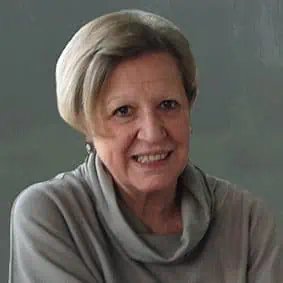
Professor Emerita at the National and Kapodistrian University of Athens (NKUA), Director of the Research Centre for Language Teaching and Assessment (RCeL), and Head of the Scientific Committee of the Centre of Excellence for Multilingualism and Language Policy (CEM) at the NKUA. Since 2003, she is President of the Examination Board of the Greek national foreign languages examination suite (known as KPG). Her research interests lie in foreign language pedagogy, curriculum and materials development, plurilingual competence and intra-/cross-linguistic mediation, language testing and assessment. Yet, her keen interest in socially accountable applied linguistics has also led her to investigate the bureaucratic discourse in Greek public documents, as well as linguistically construed gender ideology and the linguistic representations of poverty and of ecology. She publishes in English and Greek, but some of her publications have also appeared in Spanish, Portuguese and French. The Hegemony of English (Routledge), co-authored with D. Macedo and P. Gounari received the 2004 American Educational Studies Association Critics’ Choice Award in the USA, and was later translated in Portuguese, Spanish and Greek. She has been President of the ECSPM since 2014 and instigator of the ECSPM-CURUM.
Basilique (Bessie) Dendrinou
Professeur émérite à l’Université nationale et kapodistrienne d’Athènes (NKUA), directrice du Centre de recherche sur l’enseignement et l’évaluation des langues (RCeL) et chef du comité scientifique du Centre d’excellence pour le multilinguisme et la politique linguistique (CEM) à la NKUA. Depuis 2003, elle est présidente du jury d’examen de la suite d’examens nationaux grecs de langues étrangères (connue sous le nom de KPG). Ses recherches portent sur la pédagogie des langues étrangères, le développement de programmes et de matériels, la compétence plurilingue et la médiation intra/interlinguistique, les tests et l’évaluation des langues. Cependant, son vif intérêt pour la linguistique appliquée socialement responsable l’a également amenée à étudier le discours bureaucratique dans les documents publics grecs, ainsi que l’idéologie du genre construite linguistiquement et les représentations linguistiques de la pauvreté et de l’écologie. Elle publie en anglais et en grec, mais certaines de ses publications sont également parues en espagnol, en portugais et en français. The Hegemony of English (Routledge), coécrit avec D. Macedo et P. Gounari, a reçu le prix 2004 de l’American Educational Studies Association Critics’ Choice Award aux États-Unis, et a ensuite été traduit en portugais, en espagnol et en grec. Elle est présidente de la CECPM depuis 2014 et instigatrice de la CECPM-CURUM.
Η ΔΙΑΜΕΣΟΛΑΒΗΣΗ ΩΣ ΜΕΣΟΝ ΔΙΑΔΡΑΣΤΙΚΗΣ ΜΑΘΗΣΗΣ ΣΕ ΠΟΛΥΓΩΣΣΙΚΑ ΕΚΠΑΙΔΕΥΤΙΚΑ ΠΕΡΙΒΑΛΛΟΝΤΑ
MEDIATION AS A MEANS TO INTERACTIVE LEARNING IN MULTILINGUAL EDUCATIONAL SPACES
LA MÉDIATION COMME MOYEN D’APPRENTISSAGE INTERACTIF DANS LES ESPACES ÉDUCATIFS MULTILINGUES
Abstract
Όταν η έννοια της διαγλωσσικής διαμεσολάβησης εμφανίστηκε στο ΚΕΠΑ (Συμβούλιο της Ευρώπης 2001), αγνοήθηκε από τη διεθνή ξενόγλωσση εκπαιδευτική κοινότητα, κυρίως λόγω του τότε κυρίαρχου μονογλωσσικού παραδείγματος στη διδασκαλία των ξένων γλωσσών, αλλά και επειδή η έννοια δεν είχε οριστεί επαρκώς και περιγραφεί κατά επίπεδο γλωσσομάθειας, όπως οι δραστηριότητες της κατανόησης και παραγωγής λόγου. Μόνο η Γερμανία και η Ελλάδα υιοθέτησαν το 2003 την έννοια αυτή, καθώς η πρώτη την συμπεριέλαβε στα ομοσπονδιακά της προγράμματα σπουδών για τις ξένες γλώσσες και η δεύτερη την συμπεριέλαβε ως αντικείμενο αξιολόγησης στις εξετάσεις για το ΚΠΓ. Τώρα πια, είκοσι χρόνια μετά, η γλωσσική διαμεσολάβηση προσελκύει την προσοχή της ξενόγλωσσης εκπαιδευτικής κοινότητας λόγω της συμπερίληψής της με λεπτομερείς κλιμακωτούς περιγραφικούς δείκτες στο CEFRCV (Συμβούλιο της Ευρώπης 2020).
Ωστόσο, όπως υποστηρίζω στο βιβλίο μου, Mediation as Negotiation of Meanings, Plurilingualism and Language Education (Routledge 2024), η διαμεσολάβηση δεν είναι μονάχα ένα αντικείμενο διδασκαλίας και μάθησης στην ξενόγλωσση τάξη. Είναι μια κοινωνική πρακτική την οποία όλοι ασκούμε με μια διαισθητικά αναπτυγμένη ικανότητα που βελτιώνεται εμπειρικά ή/και με καθοδήγηση. Για να παρέχουμε την κατάλληλη καθοδήγηση, βέβαια, χρειαζόμαστε κοινωνιο-γλωσσολογικά και εθνογραφικά δεδομένα σχετικά με το γιατί και πώς οι άνθρωποι διαμεσολαβούν ενδογλωσσικά και διαγλωσσικά, σε διαφορετικά κοινωνικά περιβάλλοντα, καθώς επικοινωνούν με άλλους. Όμως αυτού του τύπου τα δεδομένα είναι δυσεύρετα και το έλλειμμα αυτό είναι που με οδήγησε στην απόφαση να πραγματοποιήσω μια Μελέτη Περίπτωσης, στόχος της οποίας ήταν να διερευνήσω τις πρακτικές ενδογλωσσικής και διαγλωσσικής διαμεσολάβησης των φοιτητών πανεπιστημίου και να ανακαλύψω τους τρόπους με τους οποίους διαμεσολαβούν, τι είδους ενέργειες διαμεσολάβησης εκτελούν και, όταν διαμεσολαβούν, πώς χρησιμοποιούν την ποικιλογλωσσική τους ικανότητα.
Η ευκαιρία για την υλοποίηση της μελέτης, δόθηκε με το έργο «Δυναμική πολυ-/ποικιλογλωσσία ως βάση για την αριστεία στην τριτοβάθμια εκπαίδευση χωρίς αποκλεισμούς», με επικεφαλής το Πανεπιστήμιο του Στρασβούργου. Το έργο αυτό, στο οποίο συμμετείχα ως εκπρόσωπος του ECSPM, μόλις ολοκληρώθηκε και ο σκοπός αυτής της ομιλίας είναι να παρουσιάσω τα αποτελέσματα αυτής της συγκεκριμένης μελέτης.
Toggle Here to Read the Abstract in English & French
MEDIATION AS A MEANS TO INTERACTIVE LEARNING IN MULTILINGUAL EDUCATIONAL SPACES
When the notion of cross-linguistic mediation was introduced by the CEFR (Council of Europe 2001), it was disregarded by the international foreign language community, mainly because of the still dominant monolingual paradigm in foreign language teaching, but also because the notion was not described with scaled can-do statements as others like reading, listening, reading and writing were. Only Germany and Greece adopted the notion then. The former included it in its national standards and its federal foreign language curricula and the latter included it as a ‘skill’ to be tested in its high-stakes national foreign language exams (known with the acronym KPG). Twenty years later, linguistic mediation is attracting considerable attention due to its inclusion with detailed scaled descriptors in the CEFRCV (Council of Europe, 2020). Foreign language professionals in Europe and beyond are considering how best to include it in their teaching and testing programs.
However, as I argue in my book, Mediation as Negotiation of Meanings, Plurilingualism and Language Education (Routledge 2024), mediation is not only an element to teach in foreign language classes. It is a social practice that we all engage in, with an intuitively developed ability we can improve with experience and proper guidance. To provide such guidance, we need sociolinguistic and ethnographic data about why and how people mediate across and within the same language, in different social contexts, as they interact with others. Yet, such data are lacking, and the deficit is what led me to the decision to carry out a Case Study whose aim was to investigate university students’ intra- and cross-linguistic mediation practices and to find out the ways in which they mediate, what kind of mediation actions they perform and, when they mediate, how they make use of their plurilingual competence.
The opportunity was provided through a project, entitled “Dynamic multi-/plurilingualism as a basis for excellence in inclusive higher education”, led by the University of Strasbourg. This project, in which I took part as ECSPM representative, has just been completed and the purpose of this talk is to present the results of this study.
LA MÉDIATION COMME MOYEN D’APPRENTISSAGE INTERACTIF DANS LES ESPACES ÉDUCATIFS MULTILINGUES
Lorsque la notion de médiation translinguistique a été introduite par le CECR (Conseil de l’Europe 2001), elle a été ignorée par la communauté internationale des langues étrangères, principalement en raison du paradigme monolingue encore dominant dans l’enseignement des langues étrangères, mais aussi parce que la notion n’était pas décrite par des énoncés de capacités échelonnées comme l’étaient d’autres notions telles que la lecture, l’écoute, la lecture et l’écriture. Seules l’Allemagne et la Grèce ont alors adopté la notion. La première l’a incluse dans ses normes nationales et ses programmes fédéraux d’enseignement des langues étrangères, et la seconde l’a incluse en tant que “compétence” à tester dans ses examens nationaux de langues étrangères à enjeux élevés (connus sous l’acronyme KPG). Vingt ans plus tard, la médiation linguistique fait l’objet d’une attention considérable en raison de son inclusion dans le CEFRCV (Conseil de l’Europe 2020) avec des descripteurs détaillés et échelonnés. Les professionnels des langues étrangères en Europe et ailleurs réfléchissent à la meilleure façon de l’inclure dans leurs programmes d’enseignement et d’évaluation.
Cependant, comme je l’affirme dans mon livre, Mediation as Negotiation of Meanings, Plurilingualism and Language Education (Routledge 2024), la médiation n’est pas seulement un élément à enseigner dans les cours de langues étrangères. Il s’agit d’une pratique sociale dans laquelle nous nous engageons tous, avec une capacité développée intuitivement que nous pouvons améliorer avec de l’expérience et des conseils appropriés. Pour fournir de tels conseils, nous avons besoin de données sociolinguistiques et ethnographiques sur le pourquoi et le comment de la médiation à travers et à l’intérieur d’une même langue, dans différents contextes sociaux, lorsqu’ils interagissent avec d’autres. Or, ces données font défaut, et c’est ce déficit qui m’a amené à décider de réaliser une étude de cas dont l’objectif était d’enquêter sur les pratiques de médiation intra- et interlinguistique des étudiants universitaires et de découvrir leurs modes de médiation, le type d’actions de médiation qu’ils réalisent et, lorsqu’ils font de la médiation, la manière dont ils utilisent leur compétence plurilingue.
L’occasion m’a été donnée par un projet intitulé « Le multi-/plurilinguisme dynamique, terreau de l’excellence inclusive dans l’enseignement supérieur », mené par l’Université de Strasbourg. Ce projet, auquel j’ai participé en tant que représentant de la CEMSP, vient de s’achever et l’objectif de cet exposé est de présenter les résultats de cette étude.
